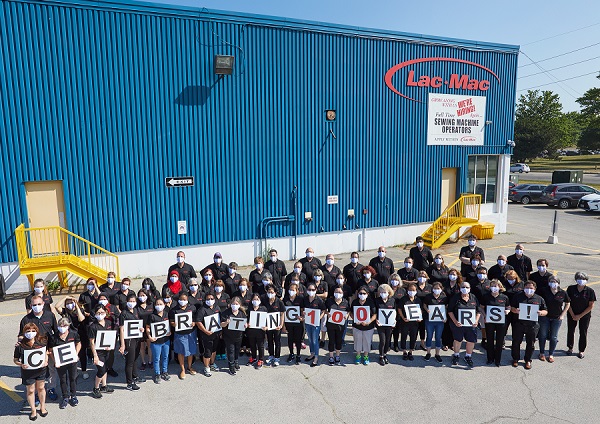How the Canada-EU trade agreement and CanExport funding helped bring Lac-Mac’s personal protective equipment to the world

When London, Ontario-based Lac-Mac set up shop in 1920, the world was a very different place, and the company settled into its niche producing and supplying uniforms for nursing schools across the country.
In the 1980s, the outbreak of HIV/AIDS prompted Lac-Mac to develop a surgical gown that could provide protection from this new disease and other blood-borne pathogens.

Thus began the company’s quest for a liquid-proof barrier material for their reusable surgical gowns, which led it to Gore-Tex technology. In 1988, following several years of development and testing, Lac-Mac introduced its line of reusable operating room gowns and drapes made from Gore Surgical Barrier Fabrics.
Lac-Mac has been a licensed manufacturer of Gore-Tex products for more than 30 years. Today, the company markets its reusable surgical gowns and drapes under its exclusive R.MOR.Tex brand. It specializes in customizable, high quality, high-performance, liquid-proof, breathable personal protective equipment (PPE) for various market segments, all manufactured in Canada.
One hundred years after its humble beginnings, Lac-Mac’s market has expanded to the United States, the United Kingdom, Europe, Australia and New Zealand.
Lac-Mac’s president, Shelley White, and director of marketing and regulatory affairs, Shelley Petrovskis, both credit CanExport funding with helping their company expand into Australia, New Zealand and the United Kingdom.
Specifically, CanExport funding was essential to helping Lac-Mac develop new markets in Australia and New Zealand by allowing company representatives to meet with current and potential customers, provide training for distributors, tour facilities and perform product demonstrations, resulting in new customers and more business.
In addition to CanExport funding, White says the Canadian Trade Commissioner Service’s (TCS’s) Regional Office in Ontario helped with funding applications, and with introductions to the Trade Commissioner Service staff in the “other London” (the one in the United Kingdom) and other markets abroad.
Lac-Mac produces all its products in Canada but imports a large amount of technical equipment and machinery from Europe. It then exports finished products. In this process, the Canada-EU Comprehensive Economic and Trade Agreement (CETA) has been instrumental in helping to open doors and remove trade barriers: not only does CETA offer preferential tariff treatment for the company’s exports—either reducing tariffs or eliminating them completely—it also reduces the company’s import costs. Additionally, the Comprehensive and Progressive Agreement for Trans-Pacific Partnership (CPTPP) has greatly helped Lac-Mac tap into Australia and New Zealand by also ensuring preferential tariff treatment for the company’s exports.

Currently, the majority of Lac-Mac’s sales are derived from North America, with Canadian and U.S. health care being the company’s primary market, followed by Australia and Europe for other product segments.
While COVID-19 forced Lac-Mac to postpone a follow-up business trip to Australia and New Zealand in March 2020, the pandemic has led to a dramatic increase in market demand for surgical gowns since the beginning of 2020.
According to Petrovskis, the last 6 months have seen a significant increase in demand for PPE, particularly in Canada and the United States, and this shows no signs of slowing down. This has led to many employees working overtime to keep up with demand, and Lac-Mac has even had to engage sub-contractors to help them.
According to White, the next 12 to 18 months will be very exciting for the company, as it plans to further increase capacity to meet the growing demand due in part, she says, to changing attitudes toward the recognition and acceptance of reusable PPE in the health care industry. “People are realizing that disposable PPE products aren’t as reliable as reusable products and that companies—and countries—can no longer rely solely on offshore sources for disposable products,” she adds.
Thanks to their expertise in manufacturing performance PPE using various barrier fabrics and the global need for timely, dependable access to safe, reputable PPE products, White and Petrovskis see many opportunities for Lac-Mac to grow internationally.
And as it does, the TCS will be there to help them, every step of the way. “Lac-Mac values TCS’s support, which can be directly credited with our success in expanding our product offering to new international markets,” White says.
Similar to Lac-Mac, your company could save money by exporting to an FTA market. Calculate your tariffs using the .
- Date modified: